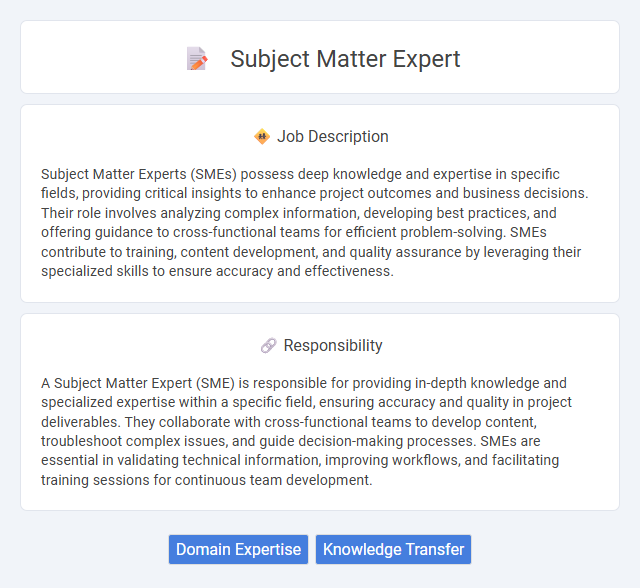
Subject Matter Experts (SMEs) possess deep knowledge and expertise in specific fields, providing critical insights to enhance project outcomes and business decisions. Their role involves analyzing complex information, developing best practices, and offering guidance to cross-functional teams for efficient problem-solving. SMEs contribute to training, content development, and quality assurance by leveraging their specialized skills to ensure accuracy and effectiveness.
Individuals with deep expertise and strong analytical skills are likely suitable for a Subject Matter Expert role, as it demands precise knowledge and the ability to communicate complex information clearly. People who thrive in collaborative environments and can adapt to evolving project requirements will probably excel in this position. Conversely, those who prefer routine tasks or lack specialized knowledge may find the role challenging or less fitting for their strengths.
Qualification
Subject Matter Experts typically possess advanced degrees in their field, such as a master's or doctorate, combined with extensive industry experience exceeding 5 to 10 years. Proficiency in specialized knowledge areas, strong analytical skills, and the ability to communicate complex concepts clearly are essential qualifications. Certifications relevant to the industry, such as PMP for project management or CISSP for cybersecurity, further validate a Subject Matter Expert's expertise.
Responsibility
A Subject Matter Expert (SME) is responsible for providing in-depth knowledge and specialized expertise within a specific field, ensuring accuracy and quality in project deliverables. They collaborate with cross-functional teams to develop content, troubleshoot complex issues, and guide decision-making processes. SMEs are essential in validating technical information, improving workflows, and facilitating training sessions for continuous team development.
Benefit
A Subject Matter Expert (SME) can significantly enhance project outcomes by providing specialized knowledge and ensuring accuracy in technical content. Their expertise likely reduces errors and accelerates decision-making processes, contributing to overall efficiency. Engaging an SME may improve stakeholder confidence and increase the probability of successful project completion.
Challenge
Subject Matter Expert roles likely involve navigating complex industry-specific challenges that require deep knowledge and constant learning. Adapting to evolving technologies and regulations may present ongoing difficulties, demanding quick problem-solving skills. The probability of facing high-pressure situations to provide accurate and timely advice remains significant.
Career Advancement
A Subject Matter Expert (SME) plays a crucial role in providing specialized knowledge that drives project success and innovation within organizations. Leveraging expertise in a specific domain enhances opportunities for leadership roles, consulting positions, and cross-functional team collaborations, accelerating career advancement. Continuous skill development and industry certification further strengthen an SME's professional growth and marketability.
Key Terms
Domain Expertise
A Subject Matter Expert (SME) possesses in-depth domain expertise critical for guiding project strategy, ensuring technical accuracy, and enhancing decision-making processes. Their specialized knowledge across industries such as IT, healthcare, or finance enables effective communication between stakeholders and technical teams. SMEs drive innovation by applying best practices and regulatory standards unique to their field, significantly improving project outcomes.
Knowledge Transfer
Subject Matter Experts (SMEs) play a crucial role in Knowledge Transfer by providing specialized insights and expertise essential for training and development within organizations. They facilitate the seamless sharing of technical skills and domain-specific information through structured documentation, workshops, and mentoring programs. Effective Knowledge Transfer led by SMEs enhances team competency, reduces onboarding time, and supports continuous improvement in project execution.
 kuljobs.com
kuljobs.com